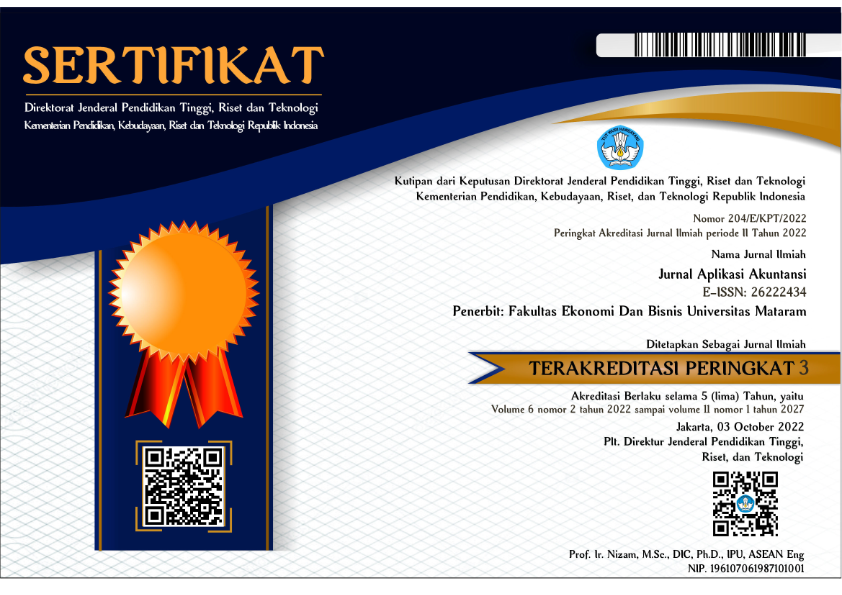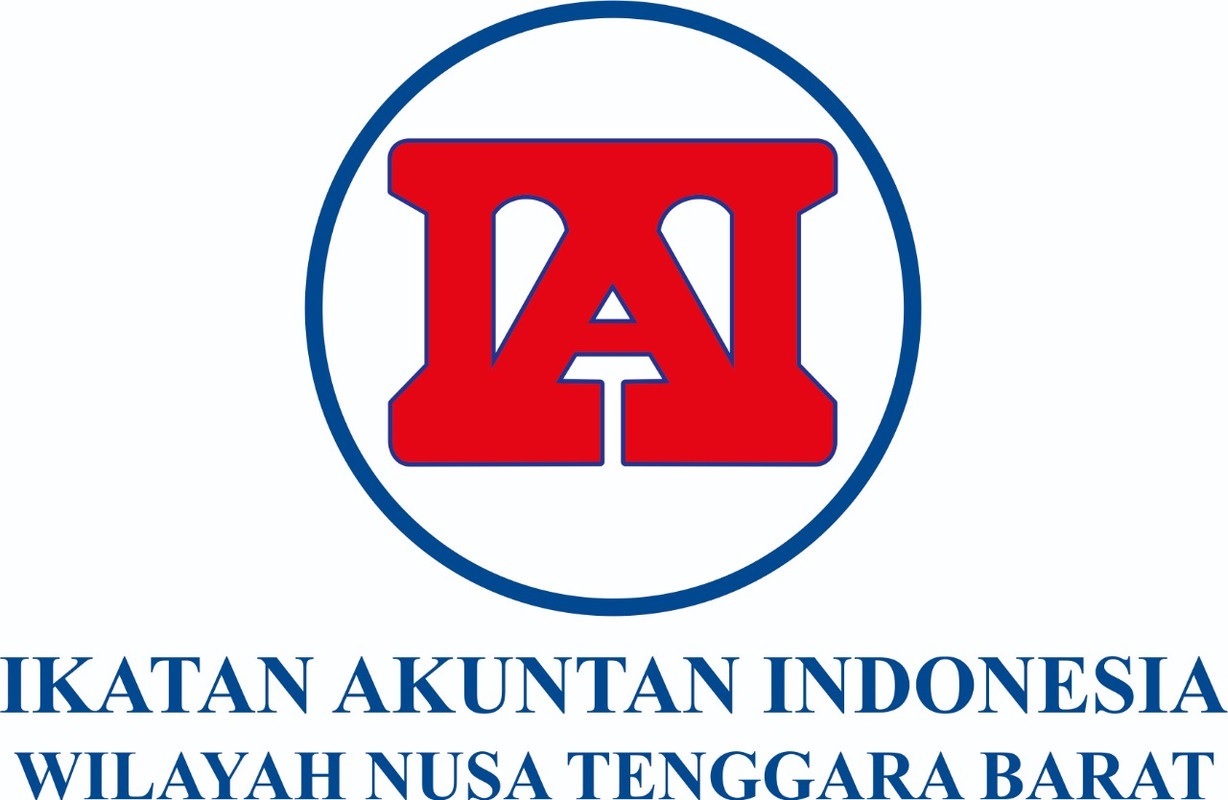THE INFLUENCE OF ISLAMIC RELIGIOSITY ON STUDENTS' FINANCIAL WELL-BEING THROUGH FINANCIAL BEHAVIOR: MODERATING ROLE OF FINANCIAL LITERACY
DOI:
https://doi.org/10.29303/jaa.v10i1.688Keywords:
financial well-being; Islamic religiosity; financial behavior; financial literacy; moderated mediationAbstract
The low level of financial well-being among university students, particularly in Pekanbaru, has become a severe concern as the number of individuals living in poverty rises and risky financial habits such as online gambling and loans become more common. This study investigates the role of Islamic religiosity in improving students' financial well-being by examining financial behavior as a mediator and financial literacy as a moderator. A survey of 124 students from four universities in Pekanbaru was conducted, and the data were analyzed using PROCESS Macro Model 8 in SPSS 25. The findings reveal that Islamic religiosity directly and indirectly influences financial well-being through financial behavior. Moreover, financial literacy strengthens the relationship between Islamic religiosity and financial behavior, but not the direct link between religiosity and financial well-being. Beyond the statistical results, this study contributes theoretically by integrating moderated mediation analysis into the context of student financial well-being, an approach rarely applied in prior studies. The results highlight the need to promote religious values and financial literacy in higher education policies and student development programs as effective strategies to foster healthier financial behavior and improve financial well-being.
References
Ajzen, I. (1991). The Theory of Planned Behavior. Organizational Behavior and Human Decision Processes, University of Massachusetts at Amherst, 50(Human Decision), 179–211.
AntaraNews. (2023, November). OJK Riau giatkan literasi keuangan cegah mahasiswa akses pinjol. Antaranews.Com. https://www.antaranews.com/berita/3821538/ojk-riau-giatkan-literasi-keuangan-cegah-mahasiswa-akses-pinjol
Ardiyani, F., Afriani, N., & Handini, N. (2023). Uji Hipotesis Penelitian Perbandingan Menggunakan Statistika Parametrik. Bakti Sosial, 2, 76–83. https://jurnal.asrypersadaquality.com/index.php/baktisosial
Ariska, S. N., Jusman, J., & Asriany, A. (2023). Pengaruh Literasi Keuangan, Financial Tekhnologi dan Gaya Hidup Hedonisme terhadap Perilaku Keuangan Mahasiswa. Owner, 7(3), 2662–2673. https://doi.org/10.33395/owner.v7i3.1472
BPS Pekanbaru. (2025). Jumlah Penduduk Miskin (Ribu Jiwa), 2021-2024. Badan Pusat Statistik Pekanbaru. https://riau.bps.go.id/indicator/23/77/1/jumlah-penduduk-miskin.html
Chatterjee, D., Kumar, M., & Dayma, K. K. (2019). Income security, social comparisons and materialism: Determinants of subjective financial well-being among Indian adults. International Journal of Bank Marketing, 37(4), 1041–1061.
Chavali, K., Raj, P. M., & Ahmed, R. (2021). Does Financial Behavior Influence Financial Well-being? Journal of Asian Finance, Economics and Business, 8(2), 273–280. https://doi.org/10.13106/jafeb.2021.vol8.no2.0273
Chetioui, H., El Bouchikhi, Y., Makhtari, M., Sahli, M., & Lebdaoui, H. (2024). An Investigation of the Impact of Financial Literacy on Households' Financial Well-Being: An Emerging Market Study. International Journal of Economics and Financial Issues, 14(3), 97–105. https://doi.org/10.32479/ijefi.15840
Defani, R. (2024). Pengaruh Literasi Keuangan dan Religiusitas terhadap Kesejahteraan Masyarakat Jawa Timur dengan Inklusi Keuangan sebagai Variabel Mediasi. Universitas Hayam Wuruk Perbanas.
Diah, A. I. G. A. A., & Henny, R. (2021). The Influence of Financial Literacy, Self-Control, Spritiual Quotient, and Financial Behavior Towards Financial Well-Being: A Case Study of Civil Servant in Kantor Regional X BKN Denpasar. Eurasia: Economics & Business, 8(50), 41–50. https://econeurasia.com/issue-2021-08/article_07.pdf
Dwiasti, A. N., & Sipayung, T. J. (2024). Pengaruh Stres Finansial terhadap Prestasi Akademik Mahasiswa di Surabaya. Musytari: Neraca Manajemen, Ekonomi, 12(7).
Goi, M. T., Palil, M. R., Zain, N. H. M., & Mamat, N. H. (2024). Self-Efficacy, Religiosity, Financial Behavior, and Financial Well-Being. Proceedings of the 9th International Conference on Marketing and Retailing (INCOMaR 2023), March 1-2, 2023, Kota Kinabalu, Sabah, Malaysia, 133, Mei Teh-431. https://doi.org/10.15405/epsbs.2024.05.35
Hayes, A. F. (2017). Introduction to mediation, moderation, and conditional process analysis: A regression-based approach. Guilford publications.
Herdjiono, I., Siswantoyo, S., Sukiyono, K., Hutama, P. S., Hakim, A. R., Nggaruaka, T., Awotkay, A. S., & Lola, M. A. (2023). Effect of Financial Behavior, Childhood Consumer Experience, And Financial Wellness on Financial Well-Being. Management:Journal of Sustainable Business and Management Solutions in Emerging Economies, 1–16. https://doi.org/10.7595/management.fon.2023.0010
Hu, L. T., & Bentler, P. M. (1999). Cutoff criteria for fit indexes in covariance structure analysis: Conventional criteria versus new alternatives. Structural Equation Modeling, 6(1), 1–55. https://doi.org/10.1080/10705519909540118
Huda, N. (2023). Pemuda dan Pusaran Pinjaman Online. https://indef.or.id/wp-content/uploads/2023/09/Presentasi-Nailul-Huda-INDEF.pdf
Lavonda, P., Setiawan, I. R., & Ekadjadja, M. (2021). Determinants of Financial Well-Being Among Young Workers in Jakarta During the Covid-19 Pandemic. Jurnal Ekonomi, 26(2), 295. https://doi.org/10.24912/je.v26i2.752
Lestari, S., & Fauzan, M. (2024). Pengaruh Komitmen, Religiusitas dan Keterlibatan Guru Terhadap Kesejahteraan Subyektif Guru Madrasah Ibtidaiyah, Juwana, Pati, Jawa Tengah. Al-Kharaj: Jurnal Ekonomi, Keuangan & Bisnis Syariah, 6(8), 6425–6436. https://doi.org/10.47467/alkharaj.v6i8.4666
Lone, U. M., & Bhat, S. A. (2022). Impact of financial literacy on financial well-being: a mediational role of financial self-efficacy. Journal of Financial Services Marketing, 29(1), 122–137. https://doi.org/10.1057/s41264-022-00183-8
Luis, L., & MN, N. (2020). Pengaruh Pengendalian Diri, Literasi serta Perilaku Keuangan Terhadap Kesejahteraan Keuangan. Jurnal Manajerial Dan Kewirausahaan, 2(4), 994. https://doi.org/10.24912/jmk.v2i4.9883
Marchyta, N. K., Lay, M., & Kusumawardhani, A. (2024). College Student's Financial Well-Being on Java Island: The Role of Financial Literacy, Financial Behavior, and Financial Socialization. International Journal of Organizational Behavior and Policy, 3(1), 27–38. https://doi.org/10.9744/ijobp.3.1.27-38
Müller, M. (2020). Item fit statistics for Rasch analysis: can we trust them? Journal of Statistical Distributions and Applications, 7(1). https://doi.org/10.1186/s40488-020-00108-7
Mulyadi, Oktrivina, A., Hendryadi, & Hendratni, T. W. (2023). The Islamic Religiosity And Financial Well-Being: A Moderated Mediation Model Of Financial Behavior And Literacy. Jurnal Reviu Akuntansi Dan Keuangan, 13(2), 249–268. https://doi.org/10.22219/jrak.v13i2.26790
Oetami, D. P. I. (2022). Pengaruh Financial Stress, Big-Five Personality, dan Ridha terhadap Financial Well-Being Pada Pekerja Yang Menikah Di JABODETABEK. Universitas Islam Negeri Syarif Hidayatullah.
Oktavianus, J., Wijaya, L. I., & Sutejo, B. S. (2025). Faktor-Faktor Yang Mempengaruhi Financial Wellbeing Generasi Z Berpenghasilan Di Surabaya, Indonesia. Jurnal Ilmiah Manajemen, Ekonomi, & Akuntansi (MEA), 9(1), 333–359. https://doi.org/10.31955/mea.v9i1.4899
Philippas, N. D., & Avdoulas, C. (2019). Financial literacy and financial well-being among generation-Z university students: Evidence from Greece. The European Journal of Finance, 26(4–5), 360–381.
Pijoh, L. F. A., Indradewa, R., & Syah, T. Y. R. (2020). Financial Literacy, Financial Behaviour and Financial Anxiety: Implication for Financial Well Being of Top Management Level Employees. Journal of Multidisciplinary Academicultidisciplinary Academic, 04(06), 381–386.
Prawitz, A. D., Garman, E. T., Sorhaindo, B., O'Neill, B., Kim, J., & Drentea, P. (2006). InCharge Financial Distress/Financial Well-Being Scale. PsycTESTS Dataset, June 2014. https://doi.org/10.1037/t60365-000
Putri, N. V. (2024). Pengaruh Literasi Keuangan Terhadap Perilaku Keuangan Mahasiswa Dengan Religiusitas Sebagai Variabel Moderasi (Studi Kasus Pada Mahasiswa Akuntansi Fakultas Ekonomi dan Bisnis Universitas Jambi). Universitas Jambi.
Rachman, A. (2025). PPATK: Perputaran Uang Judol Bisa Tembus Rp1.200 T di 2025. CNBC Indonesia. https://www.cnbcindonesia.com/news/20250509063231-4-632253/ppatk-perputaran-uang-judol-bisa-tembus-rp1200-t-di-2025
Rafik, A., & Rahayu, A. S. (2020). Financial behaviour and financial well-being of MSMEs actors: The role of financial literacy and cognitive factors. Jurnal Siasat Bisnis, 24(1), 72–86. https://doi.org/10.20885/jsb.vol24.iss1.art6
Sekaran, U., & Bougie, R. (2016). Research methods for business: A skill building approach. john wiley & sons.
Shefrin, H. M., & Thaler, R. H. (1988). The Behavioral Life-Cycle Hypothesis. Economic Inquiry, 26(4), 609–643. https://doi.org/10.1111/j.1465-7295.1988.tb01520.x
Siregar, H. D., Wassalwa, M., Janani, K., & Harahap, I. S. (2024). Analisis Uji Hipotesis Penelitian Perbandingan menggunakan Statistik Parametrik. Al Ittihadu, 3(1), 1–12.
Suidarma, I. M., Putu, N., Putri, A., & Yasa, I. N. A. (2023). Pengaruh Literasi Keuangan Terhadap Keputusan Investasi Dimoderasi Perilaku Keuangan Pada Mahasiswa. Jurnal Pendidikan Akuntansi Dan Keuangan, 11(July), 105–120.
United Healthcare. (2021). Understanding financial well-being. Www.Uhc.Com. https://www.uhc.com/content/dam/uhcdotcom/en/HealthAndWellness/PDF/Health-Tip-Financial-Well-Being-M57233.pdf
Wahyudi, A. (2024). Dampak Judi dan Pinjaman Online terhadap Masalah Sosial. Kementerian Sosial RI. https://kemensos.go.id/jurnal-dan-artikel/sekretariat-jenderal/dampak-judi-dan-pinjaman-online-terhadap-masalah-sosial
Wijaya, H. R., Hati, S. R. H., Ekaputra, I. A., & Kassim, S. (2024). The impact of religiosity and financial literacy on financial management behavior and well-being among Indonesian Muslims. Humanities and Social Sciences Communications, 11(1), 1–13. https://doi.org/10.1057/s41599-024-03309-6
Zai, S. H. D., Salsabilla, S., Halimatussakdiyah, H., & Marliyah, M. (2024). Analisis Hukum dan Dampak Sosial Utang Pinjaman Online Dalam Perspektif Fiqih Muamalah. Tashdiq: Jurnal Kajian Agama Dan Dakwah, 5(1), 1–7.
Zainurrafiqi, & Hidayati, N. (2021). Pengaruh Financial Literacy terhadap Financial Behavior dan Firm Performance dengan Religiosity Sebagai Variabel Moderasi (Survey pada Usaha Mikro Kecil Menengah Di Madura). Public Corner, 16(2), 100–118.
Downloads
Published
How to Cite
Issue
Section
License
Copyright (c) 2025 Linda Hetri Suriyanti, Fadly Ardiansyah, Nur Fitriana

This work is licensed under a Creative Commons Attribution-ShareAlike 4.0 International License.









